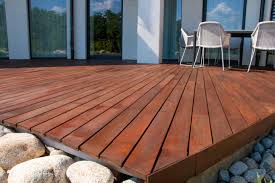In the process of designing or upgrading large outdoor spaces, choosing the correct decking material is crucial for both aesthetics and durability. Here’s everything you need to be aware of Deck boards (Deski tarasowe) alternatives to help you make an informed choice.
1. Wood Decking
Wood decking is a classic and well-liked option due to it’s natural aesthetic and warmth. The most common types include:
Pressure-Treated Lumber It is the most affordable option and is treated to repel insects and decay. However, it does require regular maintenance that includes staining and sealing.
Cedar and Redwood: These woods naturally resist decay and insects. They offer rich colors and are less prone to warping than pressure-treated lumber. They require sealing on a regular basis to keep their appearance.
Exotic Hardwoods: Options like ipe and mahogany are extremely tough and impervious to weather and insects. They are more expensive however they provide a unique appearance and long lifespan.
2. Composite Decking
Composite decking is a man-made product combining wood fibers and plastic. It offers several benefits:
Low Maintenance: Unlike wood, composite decking isn’t subject to regular sealing or staining. It is resistant to rot, insects, and fading, making it a low-maintenance option.
Durability Composite boards are made to withstand the harshest weather conditions and heavy foot traffic without warping or cracking.
Eco-friendly Options: A lot of composite products are made from recycled materials, which makes them more environmentally friendly.
3. PVC Decking
The PVC (polyvinyl chloride) decking is a synthetic option that offers a high level of durability:
Waterproof Decking made of PVC is resistant to water, which prevents issues like mildew and mold.
Resilient to Scratch and Stain: Its surface is highly resistant to stains and scratches, maintaining its appearance without much effort.
A variety of styles: PVC decking is available in a variety of colors and textures that allow for customizing to suit different design preferences.
4. Aluminum Decking
The use of aluminum decking isn’t as widespread but has distinct advantages:
Extremely Durable: Aluminum is strong and resistant to the elements. It won’t warp, rust or split.
Low Maintenance: Similar to PVC, aluminum requires minimal maintenance and is simple to clean.
Aluminum boards are lightweight: They’re more lightweight than composite and wood options, which makes them easier to install and handle.
Choosing the Right Deck Board
When selecting decking to cover a large outdoor space take into consideration factors like climate, maintenance preferences budget, as well as design objectives. Wood has a traditional look but requires upkeep, while composite and PVC offer durability and require lower maintenance. Aluminum is an excellent choice for those seeking long-lasting performance.
Evaluate your specific needs and preferences to choose the deck board that best fits your outdoor space. Ensure that it adds to the utility and beauty of your area.

